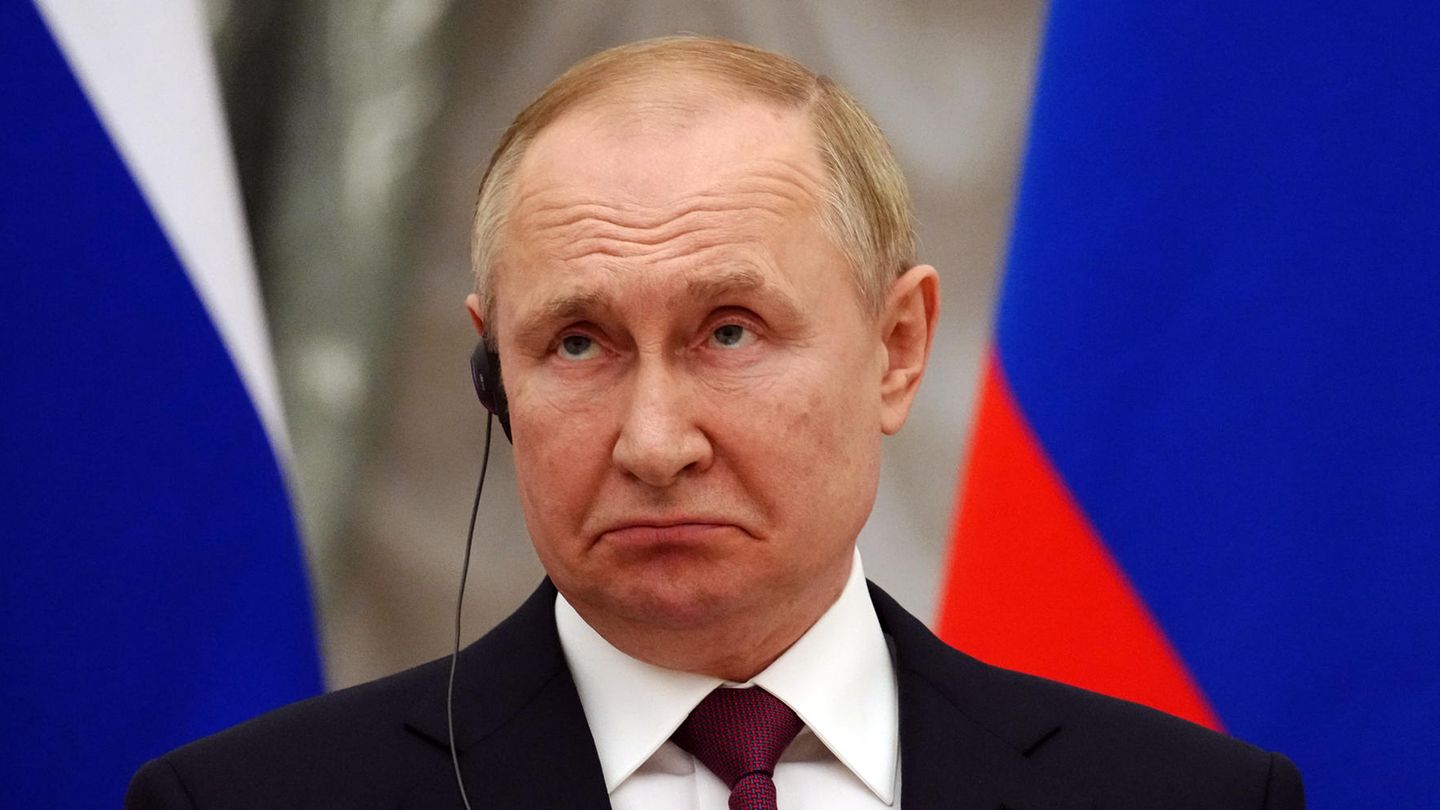The West has announced tough sanctions if Russia invades Ukraine. Some of these punitive measures would also have negative repercussions in Western countries themselves. This is what the sanctions could look like.
In the Ukraine crisis, Kiev’s western allies want to react to a possible Russian invasion with rapid, far-reaching sanctions. Punitive measures by the EU, Great Britain and the USA against Russian banks and other parts of the economy are under discussion. According to US President Joe Biden, this clearly includes the end of the Nord Stream 2 gas pipeline.
The federal government, on the other hand, refuses to name specific sanctions. “It is important that it is clearly understood that there will be tough, far-reaching measures,” said Chancellor Olaf Scholz a few days ago during his inaugural visit to Washington. “Part of it is that we don’t put everyone on the table, because it is necessary for Russia to understand that a lot more could happen than you might have calculated yourself.”
Whatever measures the West takes must be carefully considered. Because the possible penalties could not only have negative consequences for Russia, but also for the states that issue them. These sanctions are in the room:
From Nord Stream 2 in Ukraine invasion
Russia wants to deliver up to 55 billion cubic meters of gas per year to its customers in Central and Eastern Europe through the 1,230-kilometer underwater pipeline without using the overland route through the Baltic States and Ukraine. Currently, Moscow pays Ukraine about $2 billion annually in transit fees for using the route. Nord Stream 2 was completed last year, but still has to be approved by the Federal Network Agency in Bonn before it can go into operation.
Stopping the project would damage Russia economically, because Nord Stream 2 is intended to ensure direct and thus significantly cheaper supply to the European market in the long term without intermediate transit countries. Moscow would thereby also lose an important impetus for the development of new gas deposits. It would be less profitable if the gas later had to be transported further overland, which is more expensive. However, compared to oil, gas export is a much smaller factor in the Russian economy. The pipeline is therefore primarily seen as a political prestige project by Vladimir Putin. Critics fear that the Russian President wants to make the European Union more economically dependent on Nord Stream 2.
“NS2 isn’t particularly important for the Russian government to fund itself because even if the pipeline doesn’t come on line, Russia can still send gas to Europe through other tubes,” said Chris Miller, assistant professor of international history at Tufts University in Massachusetts. Still, Moscow has the most to lose by burying NS2: “It will be a major political defeat for the Kremlin, even if it won’t cost Russia much financially.”
For Germany, on the other hand, Russian gas is of great importance for the energy industry. According to the International Energy Agency (IEA), Germany imported around 56 billion cubic meters of its total consumption of 87 billion cubic meters from Russia in 2020. If Nord Stream 2 is stopped, relatively little is likely to change initially – provided Russia leaves the delivery volumes through Ukraine unchanged. Natural gas prices are already at record levels. A ton currently costs just under 100 euros, during the economic downturn in the corona crisis it was five euros.
This could be remedied above all by increasing the delivery volume through Russia, which would also be possible without the Baltic Sea pipeline, since the overland route still has capacity. But Moscow refuses to offer more gas. Critics say the Kremlin is deliberately allowing consuming countries to feel the rise in gas prices every month in order to increase pressure on Europe to get Nord Stream 2 up and running as soon as possible.
However, if the pipeline project falls victim to sanctions and the Kremlin responds by shutting off the gas supply entirely, the energy crisis is likely to escalate significantly. Although Germany has bunkered gas, the filling levels are just 35 percent of the possible utilization and thus well below the levels a year ago. The other main suppliers Norway (27 percent) and the Netherlands (21 percent) could hardly step in. Norwegian production is already at its limit and the Netherlands actually wants to stop producing natural gas after the earthquake in the Groningen region.
The USA says it is working on securing energy supplies from other sources so that Russia’s European customers can get the gas they need even in the event of a blockade. However, this is mainly American liquefied gas, and Germany does not yet have the necessary LNG terminals for this. Such a gas port is only just being built in Brunsbüttel in Schleswig-Holstein. In addition, the quantities would not be sufficient: “The USA cannot compensate for the natural gas from Russia with their LNG,” said the head of the energy giant Eon, Leonhard Birnbaum, in January.
And another inconvenience would result from the end of Nord Stream 2: behind the project is the Russian state-owned company Gazprom as the sole owner. Gazprom will bear half of the total cost of 9.5 billion euros. The energy companies OMV from Austria, Royal Dutch Shell from Great Britain, the French Engie and the German companies Wintershall Dea and Uniper are also involved in the financing. If the pipeline does not go into operation, the companies involved could sue for damages in the billions.
Cutting off Russia from money transfer by Swift ban
It is considered an “economic nuclear bomb”: the ban on Russia from the international banking communications network Swift. Money is transferred from bank to bank worldwide via Swift. The cooperative provides the technical infrastructure so that financial institutions can securely communicate with each other when transferring money across national borders. Exclusion would cut off Russia from most international financial transactions, including its international profits from oil and gas production, which account for more than 40 percent of the country’s revenues.
The flip side of the coin: the measure could also affect the West, as it could prevent Western financial institutions from doing business with Russia. The export nation Germany could feel this particularly badly. In 2020, goods worth around 23.09 billion euros were exported to Russia from Germany.
In addition, Moscow could retaliate by cutting oil and gas exports, with the consequences described above. Above all, countries that – like Germany – are heavily dependent on Russian gas want to keep payment channels open. “In the end, the hardest stick will not always be the smartest sword,” warned Federal Foreign Minister Annalena Baerbock at the end of January.
Another weakness of the punitive measure: Russia has been preparing for such a possible step since its annexation of Crimea in 2014, which also led to calls for a Swift exclusion. For example, the Kremlin created the Russian equivalent SPFS, which banks can switch to.
Citing officials in the US and Europe that a Swift ban from Russia is no longer an option after there have been significant objections from European countries. Instead, large Russian banks should be targeted.
export controls
The US government is considering imposing strict export control measures that could prevent Russia from acquiring high-tech components used in smartphones, planes and cars. One option would be to add Russia to the group of countries with the most restrictive export controls, which already includes Cuba, Iran, North Korea and Syria. That would mean Russia’s ability to source high-tech components would be severely limited, since virtually all semiconductors are developed with US-made software and parts. The impact could also extend to machine tools, smartphones, gaming consoles, tablets and televisions.
The sanctions could also target key Russian industries, including defense and civil aviation, which would hamper Russia’s high-tech ambitions in artificial intelligence or quantum computing.
The EU has already brought such export controls into play: In the event of a Russian attack on Ukraine, the punitive measures would affect not only Russia’s financial and energy sectors but also “the export of high-tech products,” said EU Commission President Ursula von der Leyen last Friday after a phone call with a number of Western leaders. The sanctions would be “massive,” she stressed.
Sanctions against Putin personally
An invasion of Ukraine could also have unpleasant personal consequences for Russian President Vladimir Putin and members of his inner circle. In the US Senate, Democrats have tabled a bill that would allow the Biden administration to block all US asset transactions and interests in assets owned by Putin and more than a dozen other senior Russian government and military officials. The White House has already announced its support for this measure.
The bill also stipulates that the US State Department would be required to prepare a detailed report on the personal net worth and assets of Putin and his close circle.
A separate bill by Republican Rep. Jim Banks intends to tighten sanctions against Putin himself now, rather than wait for an invasion. The measure, backed by 40 other House Republicans, prompts the government to consider penalties against numerous members of Russia’s leadership, including members of Putin’s family and his alleged longtime girlfriend Alina Kabaeva, a former gymnast and Olympian .
Personally targeting a foreign leader would be unusual, but not unprecedented. Two years ago, the US House of Representatives passed what would have punished Turkish President Recep Tayyip Erdogan for Turkey’s attack on US-allied Kurdish forces in Syria. The bill called for a report on the estimated net worth, sources of income, assets and investments of the president and his family members, including spouses, children and siblings, amid speculation about Erdogan’s finances. However, the draft was blocked in the Senate.
Sources: , , , , , , , , ,
Source: Stern
David William is a talented author who has made a name for himself in the world of writing. He is a professional author who writes on a wide range of topics, from general interest to opinion news. David is currently working as a writer at 24 hours worlds where he brings his unique perspective and in-depth research to his articles, making them both informative and engaging.




